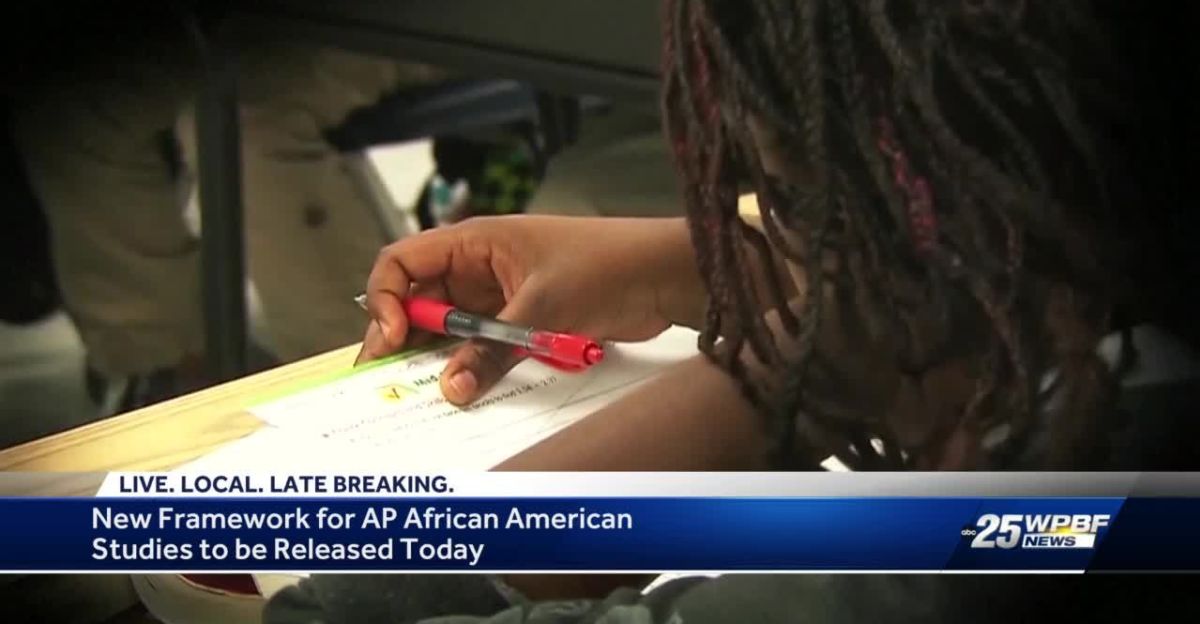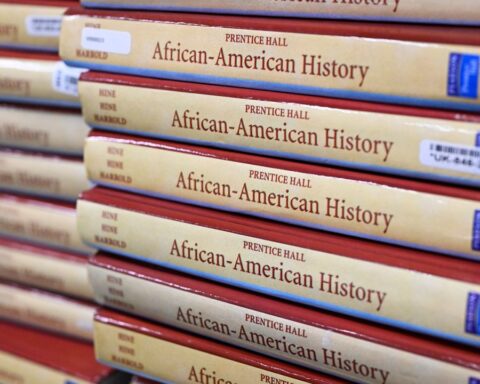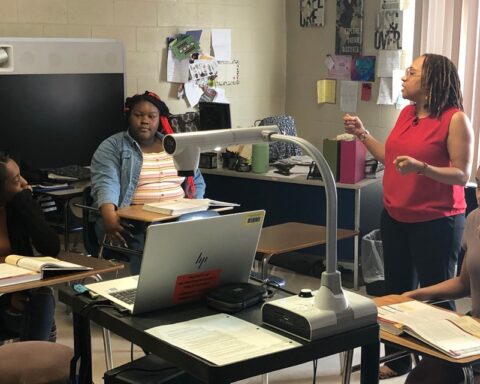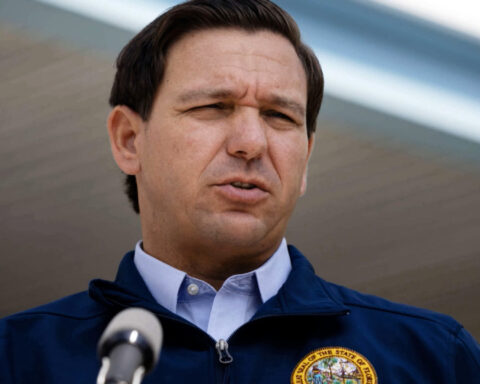By Adam Edelman and Rose Horowitch
The College Board is set to release a revised framework Wednesday for an Advanced Placement African American studies course that was thrust into the national spotlight after Florida rejected it for allegedly having a left-wing bias.
Shortly after Florida’s decision, the College Board, a nonprofit that oversees the AP program, announced that it would come out with a revision. But academic experts responsible for creating the framework insist that the revisions were scheduled long before the criticism, and, they said, they are not caving to pressure from the administration of Republican Gov. Ron DeSantis.
In interviews with NBC News, they also said they were appalled by the governor’s criticism and believed his administration’s actions were fueled by racism and ignorance.
“The story here is that Florida doesn’t believe African American studies has educational value and it’s not because of these reasons [provided by the state]. These reasons are sort of the justification for a foregone conclusion” said Robert Patterson, a professor of African American studies at Georgetown University and a member of the development committee and advisory board for the course. “I think that part of it has to do with white supremacy and anti-Black racism.”
Jeremy Redfern, a DeSantis spokesperson, responded by slamming critics like Patterson and other academics as “extreme” and condemning media outlets for giving them a platform.
“There will always be extreme critics, but it is the media’s choice whether to give them a platform and legitimize their extremism,” he said in a statement. “If you choose to print such critique and amplify it as a perspective by which we are guilty until proven innocent, it will speak more to the moral bankruptcy and untruthfulness of your outlet than anything else.”
The academics affiliated with the College Board said the changes to the African American studies course were based on a long-planned and ongoing review by a group of experts with specialties related to African American studies, as well as student and teacher feedback from a pilot program of the course.
This month, DeSantis’ administration announced that a new African American studies course would not be taught in Florida high schools. The state education department claimed the material was not historically accurate and violated the state’s “Stop WOKE Act,” a law DeSantis signed last year that effectively curtails conversations about race in schools.
State officials listed six areas of concern with the course and pointed to works by Black writers like Kimberlé W. Crenshaw, bell hooks and Angela Davis that it found objectionable.
The areas of concern were: Black Queer Studies, Intersectionality, Movement for Black Lives, Black Feminist Literary Thought, The Reparations Movement and Black Struggle in the 21st Century.
“I see a lot of the fear-based rejection of the course coming from a place of ignorance on many fronts,” said Teresa Reed, the dean of the School of Music at the University of Louisville and a member of the development committee for the AP course’s framework.
Reed said DeSantis and other officials in his administration were “acting out” the “tendency that we often have to instantly reject what we don’t understand or to instantly reject something for which our knowledge is too shallow to fully comprehend.”
“We don’t see information. We don’t see intelligent reactions, we see fear, we see a lot of assumptions, we see an accusation of indoctrination,” Wood continued. “In fact, none of those things are the objective of any AP course, any more than would be the case for AP Chemistry or AP Biology.”
Many of the academics also saw political motives in the moves of DeSantis, who is widely seen as a possible 2024 presidential candidate.
“The Florida decision is based on the political dogma of a conservative seeking the presidency. It is not a decision based in education, rigorous engagement with the subject, or concern over parental rights,” Nishani Frazier, a professor of history and American studies at the University of Kansas and a member of the development committee, wrote in a statement to NBC News. “If that were the case, parents would also have final say over chemistry and math. Ultimately, this is a debate over the identity of America — who is included and who is not.”
The fact that the College Board announced that it would release an updated version right after Florida’s objections led to questions of whether it was bowing to Republican pressure from academics and Democratic politicians.
But the nonprofit organization has consistently maintained that the revised material had been under development since March 2022, and would be based wholly on the input of educators and experts in the field, including 300 professors of African American studies across the U.S.
In a private letter to members sent last week, the College Board said that the revised framework was “shaped only by the input of experts and long-standing AP principles and practices” and that states had not influenced the revisions. Experts involved with the curriculum framework interviewed by NBC News stuck to that explanation.
“The curriculum that is being released on Feb. 1 is in response to experts, the development committee, the teachers, the students,” Patterson said. “That is what that is in response to. It is not a response to the state of Florida.”
Patterson said College Board officials decided last fall to release an updated version of the curriculum on Feb. 1.
Spokespersons for the College Board did not respond to questions about when the specific plan to release the revised framework on Feb. 1 had been established, or whether specific deadlines had been established for future revisions.
However, Reed, the development committee member, reiterated that while the updated framework to be released Wednesday “will be different from the framework that drew strong reactions,” it “will not be because of the objections.”
Patterson noted that the DeSantis administration was looking at a nonfinalized version of the course and that it was possible that some of the items Florida officials had objected to had been removed as part of the College Board’s existing process.
They, and the other College Board affiliated educators interviewed by NBC News, said they could not disclose details about what had been revised and why.
All remained adamant that politicians be excluded from all decisions.
“Politicians who don’t know history are making decisions about how it’s taught, and that’s a problem,” said Daina Ramey Berry, a professor of African and African diaspora studies at the University of Texas-Austin and a member of the advisory board.
But some suggested that some of the criteria used to evaluate potential cuts could leave room for interpretation.
Patterson said that some revisions would come down to “reducing content” — meaning, some lessons would have to be removed to fit within the literal time confines of a school semester and to allow students to conduct a term-ending research project — but wouldn’t say which elements of the framework were under consideration for being cut.
And at least one person — development committee member Frazier — acknowledged that the College Board “like any institution” was “susceptible to political influences in decision making” in what elements it might decide to cut.
Many of the academics interviewed by NBC News said that even if the College Board were to scrap some of the material Florida specifically objected to, it wouldn’t be enough for critics.
“It’s doubtful that the ‘areas of concern’ will end there,” Frazier stated.
Still, others said DeSantis’ criticism was itself evidence that the course, if left largely intact, was vital for so many individuals.
“I think he’s strengthening the argument for why the course is needed,” Wood said.
“The irony here is that I think DeSantis should be first in line to enroll in the course. In which case, he might learn … that the very platforms upon which his protests are built are platforms of ignorance.”




